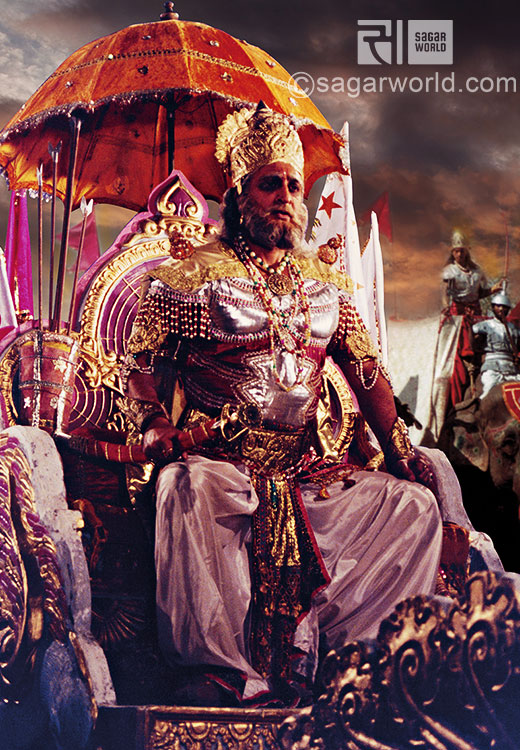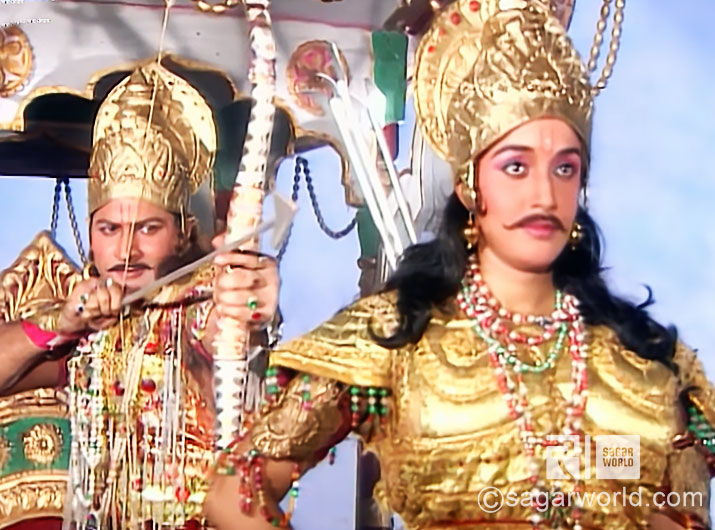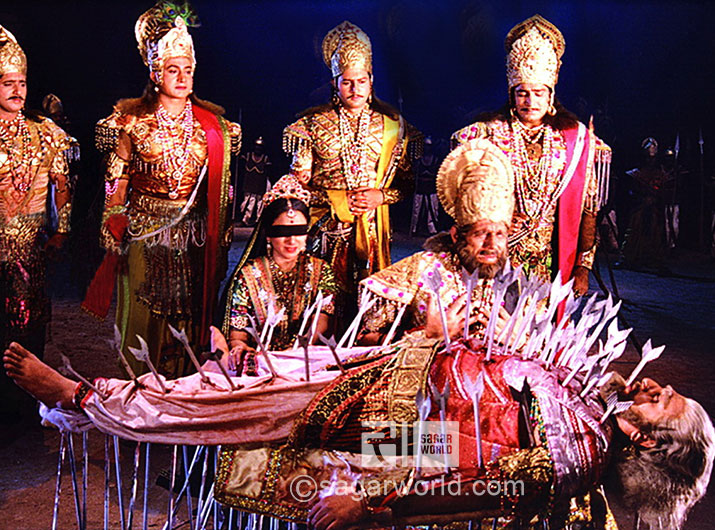(Other names: Bhishma, Bhismaa, Devvrata, Devavrath)

Bhishma was the son of King Shantanu and Ganga. That is why he is also called Gangeya. Once, the eight Vasus (“Ashtavasus”) visited the Vashishtha’s ashram accompanied by their wives.
One of the wives took a fancy to Nandini, the wish-bearing cow, and asked her husband Prabhas to steal it from Vashishta. Prabhas then stole the cow with the help of the others who were all consequently cursed by Vashishta to be born in the world of men.
The seven Vasus who assisted in stealing Nandini have their curse mitigated to be liberated from their human birth as soon as they are born, but Prabhas, due to his being instrumental in the theft, is cursed to endure a longer life on the earth, though the curse is softened so that he becomes one of the most illustrious men of his times. It was this Prabhas who took birth as Devavrath (Bhishma).
All of them took birth as Ganga’s sons. Ganga set afloat seven sons in the river as soon as they were born. Shantanu kept the eight one for himself.
Though Ganga had married Shantanu on a condition that he will never interfere in Ganga’s decisions, by keeping the eighth child, the promise was broken and so Ganga went away.
The eighth son was Bhisma – he was named Devavrath. He was engrossed in unselfish filial duty. Bhisma was a great warrior and a majestic person. He was an honest person and could sacrifice anything like wealth or heaven but could not part ways from the path of truth. He learnt the science of arms from Parshuram.

Devavrath became known as Bhisma because he took the bhishan pratigya — the vow of life-long celibacy and of service to whoever sat on the throne of his father (the throne of Hastinapur).
This was because when his father Shantanu wanted to marry a fisher woman Satyavati, her father refused; on the grounds that his daughter’s children would never be rulers as Shantanu already had a son (Devavrath).
This made Shantanu despondent. To convince Satyavati’s father, Devavrath promised that he would never stake a claim to the throne, implying that the child born to Shantanu and Satyavati would become the ruler after Shantanu.
At this, Satyavati’s father retorted that even if Devavrath gave up his claim to the throne, his (Devavrath’s) children would still claim the throne.
At this, Devavrath, to make his father happy, took the terrible vow, thus sacrificing his ‘crown-prince’ title. This gave him immediate recognition among the gods and his father granted him the boon of Swechha Mrityu (control over his own death — he could choose the time of his death, but he was not immortal).
On being adamant about not marrying Kashiraj’s daughter, there was a fight between Parshuram and Bhisma which lasted for twenty three days. The teacher could not defeat his student. In the end, the deities intervened and stopped the war.In the process of finding a bride for h

In the process of finding a bride for his half-brother the young king Vichitravirya, Bhishma cleverly abducted princesses Amba, Ambika and Ambalika of Kashi (Varanasi) from the assemblage of suitors at their Swayamvar.
Shalwa, the ruler of Saubal, and Amba (the eldest princess) were in love. Upon reaching Hastinapur, Amba confided in Bhishma that she wished to wed Salwa.
Bhishma then sent her back to Shalwa who turned her down as it was humiliating for a man to accept a woman so long in the company of another man.
She then naturally approached Bhisma who refused her, citing his oath. Amba, who was humiliated and enraged beyond measure, vowed to avenge herself against Bhisma
In Mahabharat war Bhishma was a supreme commander of the Kauravas army . Nobody can defeat him due to his Swecha Mrityu boon then krishna sent Pandavas to Bhishma’s camp. Bhishma himself told Pandavas the way to his death if a woman attacks him in battlefield then he would surrenders his weapons.

Next day Arjun took Shikhandi alog with him on his chariot and went on to attack Bhishma. As soon as Bhishma sees Shikhadi on Arjun ‘s Chariot then he surrenders his weapons Then Arjun shots multiples arrows at Bhishma which results into him falling on the bed of arrows.







